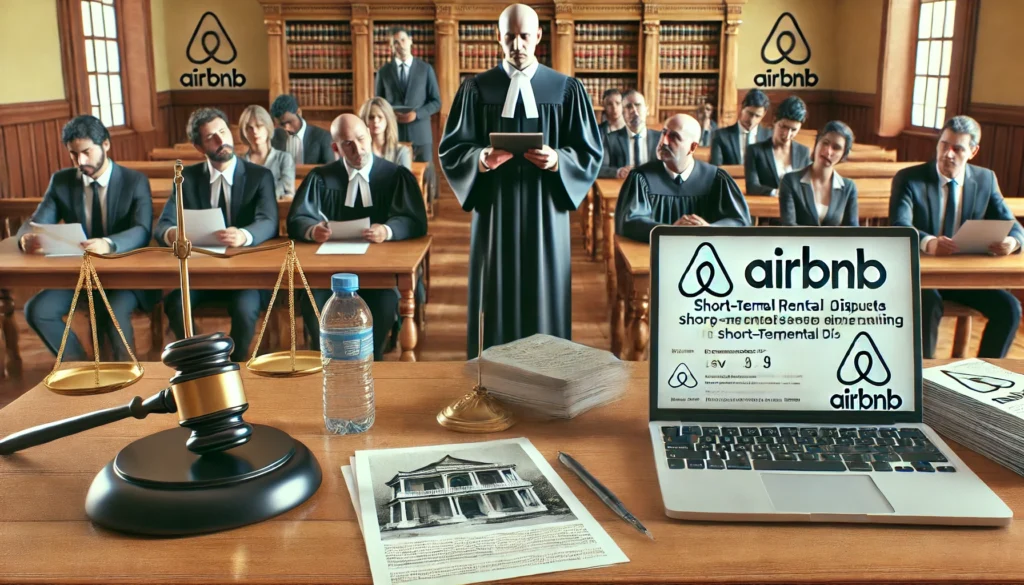Airbnb has transformed the way people travel by providing a platform for renting homes, apartments, and other properties. In Mexico, this has become especially popular, with many travelers opting for unique accommodations in cities like Mexico City, Cancún, and Tulum. While this growth in Airbnb rentals has brought significant economic benefits to property owners and tourism, it has also led to a rise in legal challenges.
The term “Mexican Lawyer Airbnb Lawsuit” refers to various legal disputes involving Airbnb rentals in Mexico. These lawsuits often highlight safety issues, tax concerns, and disputes over property rights. In this article, we will explore these challenges, the legal framework in Mexico, and how Mexican lawyers play an essential role in navigating these cases.
Understanding the Mexican Lawyer Airbnb Lawsuit: Key Legal Challenges
The term Mexican lawyer Airbnb lawsuit refers to various legal disputes surrounding short-term rentals listed on Airbnb in Mexico. These lawsuits typically involve issues like property rights, safety standards, and compliance with local laws. With the growing popularity of Airbnb in cities like Mexico City, Cancún, and Tulum, many property owners have entered the short-term rental market, often without fully understanding their legal responsibilities.
Key challenges include zoning law violations, as some rentals operate in areas not designated for commercial use, and safety concerns, such as properties lacking essential features like smoke or carbon monoxide detectors. Additionally, many hosts struggle with tax compliance, as Mexican authorities increasingly enforce regulations on rental income.
Mexican lawyers play a vital role in these cases by representing both hosts and guests in disputes. For hosts, this may involve defending against claims of negligence or illegal operations. For guests, lawsuits often focus on personal injury or property safety concerns. These legal experts also mediate between Airbnb, property owners, and local governments to ensure proper compliance with laws.
The rise of these lawsuits underscores the importance of adhering to safety and legal standards to foster trust and sustainability in Mexico’s growing short-term rental market.
Background Information
Growth of Airbnb in Mexico
Airbnb has seen remarkable growth in Mexico over the past decade. Tourists, both international and domestic, have flocked to popular destinations, seeking alternatives to traditional hotels. Whether it’s a beachside villa in Cancún or an apartment in the heart of Mexico City, Airbnb offers a wide variety of options. For many, these rentals are more affordable and provide a more personal experience compared to hotels.
However, this rapid expansion has led to challenges. Many hosts fail to comply with local rental laws, creating tensions between local governments, property owners, and the community. Cities like Mexico City and Tulum have seen pushback from residents who argue that Airbnb rentals contribute to rising rent prices, disrupt neighborhoods, and violate zoning laws.
Key Legal and Safety Concerns
Legal and safety concerns are a major issue in Airbnb lawsuits in Mexico. The most prominent issues include:
- Property Law Compliance: Many Airbnb hosts fail to obtain the necessary permits for short-term rentals. This can lead to fines or legal action from local authorities.
- Safety Standards: In some cases, properties lack basic safety features, such as smoke detectors or carbon monoxide alarms, which are crucial to ensuring the well-being of guests.
- Tax Compliance: Airbnb hosts must adhere to tax regulations, which can be complicated and vary by region. Non-compliance can lead to legal consequences.
Notable Cases Involving Airbnb in Mexico
Kandace Florence Case
One of the most widely known cases is the tragic death of Kandace Florence, a tourist who died from carbon monoxide poisoning at an Airbnb rental in Mexico City. Florence and her friend stayed at an apartment that was not equipped with a carbon monoxide detector, a vital safety feature. Her family filed a lawsuit against Airbnb, alleging that the company failed to ensure that the property met basic safety standards. This case drew international attention to the potential dangers of short-term rentals and the need for stricter safety protocols.
Other Significant Disputes
Aside from safety concerns, there have been numerous other lawsuits related to Airbnb rentals in Mexico. Some of these involve disputes between hosts and guests over property damage or non-refundable deposits. Other lawsuits involve local residents suing Airbnb hosts for violating zoning laws, as many short-term rental properties operate in residential areas that are not designated for commercial use.
Legal Framework in Mexico
Rental Regulations
In Mexico, the legal framework for short-term rentals like those offered through Airbnb is still developing. Each city or region may have different requirements for hosts, including the need to obtain a permit, register the property with the local authorities, and adhere to zoning laws. For example, some cities restrict short-term rentals to certain areas or require landlords to provide proof of ownership.
These regulations aim to ensure that short-term rentals do not negatively impact the local community by creating noise disturbances or displacing long-term residents. However, the lack of uniformity across regions can create confusion for both hosts and guests, leading to potential legal disputes.
Property Laws and Landlord Responsibilities
In Mexico, property owners have a legal responsibility to maintain their properties in a safe and habitable condition. This includes ensuring that basic safety features, such as fire alarms and carbon monoxide detectors, are installed. For Airbnb hosts, this responsibility extends to ensuring that their properties meet safety standards and that guests are fully informed of any risks, such as the location of emergency exits.
If a guest is injured or harmed due to unsafe conditions, the host may be held liable for damages. This underscores the importance of regular maintenance and compliance with safety regulations.
Tax Compliance
Airbnb hosts in Mexico must also navigate the country’s complex tax laws. In some regions, Airbnb is required to collect local taxes on behalf of the hosts, while in others, hosts are responsible for reporting their income and paying taxes themselves. Failure to comply with these tax obligations can result in fines or legal action. Some Airbnb hosts may not be aware of their tax responsibilities, which can lead to disputes with authorities.
Role of Mexican Lawyers in Airbnb Lawsuits
Representation for Hosts and Guests
Mexican lawyers play a key role in resolving legal disputes related to Airbnb rentals. They may represent hosts in cases where guests file complaints about property damage, unsatisfactory conditions, or personal injury. On the other hand, lawyers representing guests may pursue claims against Airbnb hosts for negligence, unsafe conditions, or breach of contract.
In addition, lawyers can help ensure that both hosts and guests understand their legal rights and responsibilities. By providing legal counsel, they can help parties avoid costly disputes or reach a fair settlement.
Legal Challenges and Negotiations
In many cases, Airbnb disputes in Mexico require mediation between the host, guest, and Airbnb itself. Lawyers help negotiate settlements and assist in resolving legal challenges. Whether it’s negotiating with local authorities over zoning violations or helping hosts navigate tax issues, Mexican lawyers are vital in helping Airbnb stakeholders stay compliant with the law and avoid costly lawsuits.
Airbnb’s Response to Lawsuits
Improved Safety Measures
In response to high-profile lawsuits like the Kandace Florence case, Airbnb has implemented several safety initiatives. For example, the company now requires all properties to be equipped with smoke and carbon monoxide detectors. Additionally, Airbnb has rolled out a safety checklist for hosts to ensure that their properties meet certain standards before listing them on the platform.
These changes are part of Airbnb’s broader effort to improve the safety and reliability of its listings. The company has also taken steps to make sure that hosts are aware of the safety requirements and provide clear instructions on how to make their properties safer.
Cooperation with Local Governments
Airbnb has worked closely with local authorities in various parts of Mexico to ensure that hosts comply with rental regulations. The company has entered agreements to collect and remit taxes on behalf of hosts in some regions, ensuring that Airbnb operates legally within the country. This cooperation with local governments is crucial in reducing legal disputes and ensuring that the short-term rental market remains sustainable.
Broader Implications
Impact on Hosts and Tourists
For Airbnb hosts, the growing focus on legal compliance means increased responsibility. Hosts may need to invest in safety upgrades and ensure that their properties are fully compliant with local regulations. This can be costly, but it also helps protect both the host and the guest from potential legal issues.
For tourists, the increased attention to safety standards can make Airbnb a more reliable option. Knowing that properties are regularly inspected for safety features can provide peace of mind and encourage more people to use the platform.
Changes to Airbnb Policies
Airbnb’s response to lawsuits and legal challenges in Mexico has led to changes in its policies. The company now enforces stricter safety guidelines and takes a more proactive approach to ensure that hosts meet legal requirements. These changes are part of Airbnb’s efforts to prevent future lawsuits and maintain its reputation as a trusted platform for travelers.
Challenges and Future Considerations
Balancing Growth and Regulation
One of the main challenges facing Airbnb in Mexico is balancing rapid growth with the need for regulation. While Airbnb provides significant economic benefits to local communities, it must also comply with local zoning laws and property regulations. As the short-term rental market continues to grow, it will be important for authorities to create clear and consistent regulations that accommodate both Airbnb hosts and the broader community.
Opportunities for Legal Reform
There is an opportunity for legal reform in Mexico to create a more structured approach to short-term rentals. Clearer guidelines for property owners, as well as better enforcement of safety and tax laws, could help reduce the number of lawsuits and improve the overall rental experience. Legal reforms could also encourage more hosts to operate within the framework of the law, benefiting both hosts and guests.
Conclusion
As Airbnb continues to grow in Mexico, it is crucial for all parties involved—hosts, guests, and the platform itself—to prioritize safety and legal compliance. The rise of legal disputes, often referred to as the Mexican lawyer Airbnb lawsuit cases, highlights growing concerns over property rights, safety standards, and tax compliance. However, with improved regulations and cooperation between Airbnb and local authorities, these issues can be effectively addressed.
FAQs
Why are Airbnb hosts in Mexico involved in lawsuits?
Hosts are often sued for violating zoning laws, failing safety standards, or not complying with tax regulations.
What legal responsibilities do Airbnb hosts have in Mexico?
Hosts must ensure their properties meet safety requirements, secure permits, and comply with local tax and rental laws.
Can guests sue Airbnb directly for accidents in Mexico?
Yes, guests can sue Airbnb for negligence if the platform fails to ensure basic safety measures in listed properties.
What role do Mexican lawyers play in Airbnb lawsuits?
Mexican lawyers mediate disputes, represent parties in court, and help ensure compliance with local regulations.
How is Airbnb addressing legal challenges in Mexico?
Airbnb is improving safety protocols, collaborating with local governments, and enforcing stricter compliance rules for hosts.
Article Recommendations
Port St. Lucie Mesothelioma Lawyer Vimeo: A Victim\u2019s Guide to Finding Legal Help and Resources




